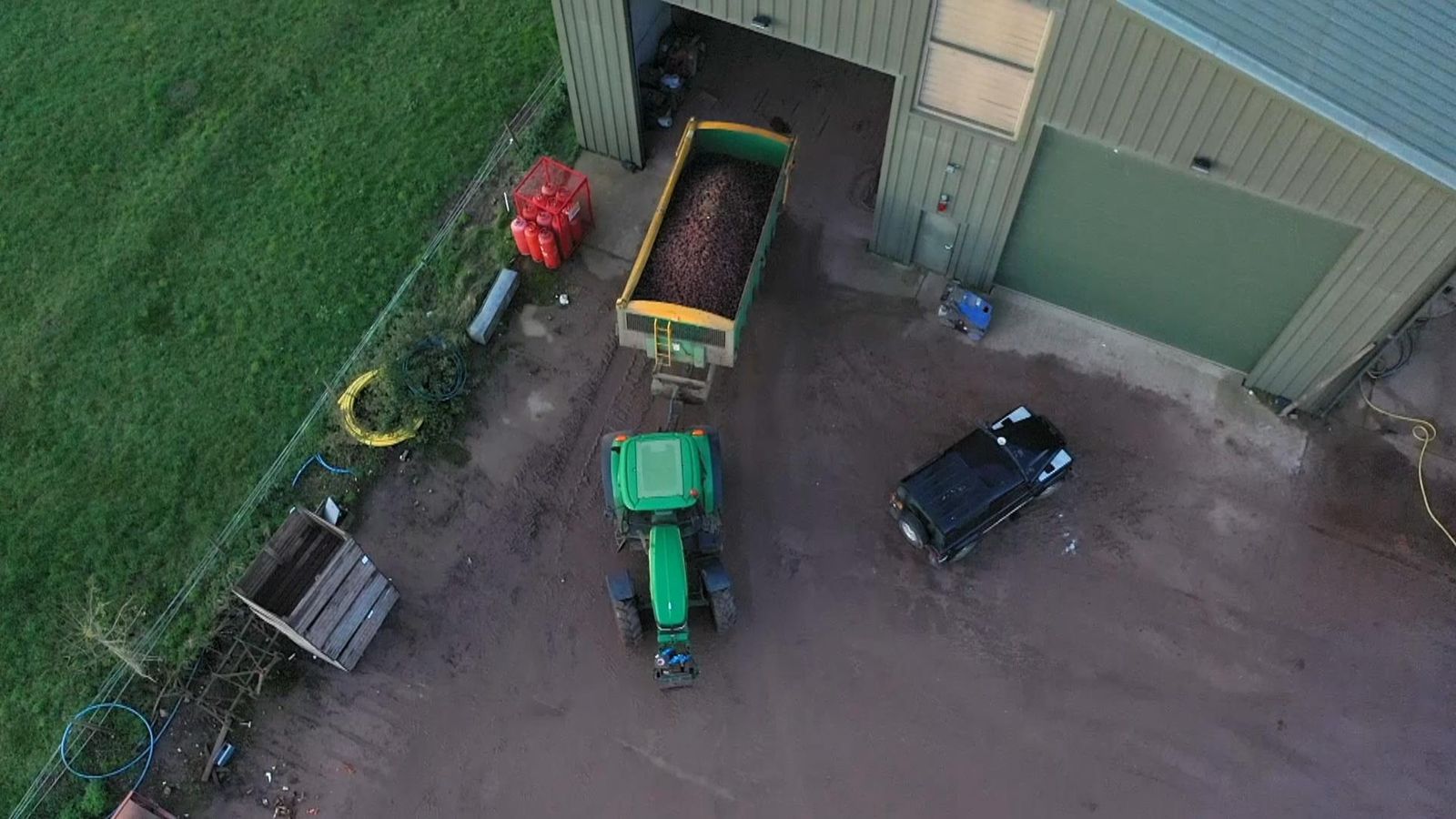Parliament will debate a petition in January calling for tougher laws to ensure supermarkets act fairly when buying produce from British farmers – with claims the industry is “on its knees”.
The Get Fair About Farming campaign has received more than 100,000 signatures – with a debate in the Commons scheduled for 22 January.
It wants an amendment made to the Grocery Supply Code of Conduct to require retailers to “buy what they agreed to buy, pay what they agreed to pay and pay on time”.
The petition was created by the founder of Riverford Organic Farmers, Guy Singh-Watson.
“Supermarkets sell over 90% of the vegetables that farmers produce. There are six major buyers. There are 10s of thousands of producers [and] when they sit down every year to negotiate the prices farmers are driven down, actually below their cost of production,” he told Sky News.
Research by the campaign says 49% of British fruit and veg farmers fear they will go out of business within the next 12 months, with 75% reporting that supermarket behaviour is a leading factor: “It’s just knocking the lifeblood out of British culture.
“We have an industry that is on its knees. Farmers don’t have the confidence to invest. They have no faith in the length of their relationship with their major buyers. You know, I think it’s a disaster environmentally, socially and commercially.”
The Department for Environment, Food and Rural Affairs (DEFRA) says it is “committed to tackling contractual unfairness that can exist in the agri-food supply chain”.
Get Fair About Farming wants retailers to sign up to a new Farmer’s Charter, which includes promises to:
• Buy what you committed to buy
• Pay on time
• Commit for the long term
• Agree on fair specifications
• Pay what you agreed to pay
Read more:
German farmers protest against plan to cut tax breaks for diesel
Food insecurity leads to unhealthy eating, MPs’ report finds
Many farmers that sell to supermarkets are wary of speaking out, fearful it could impact their livelihoods.
One potato grower – who agreed to speak to Sky News anonymously – explained how he lost thousands of pounds after a major UK supermarket cancelled 60 tonnes of salad potatoes upon harvest.
“It came to harvest time and we got the potatoes out of the ground, harvested them and at that point we got informed they’d been delisted – meaning they weren’t on the variety list that the supermarket wanted to take any longer,” they said.
“It’s frustrating because there’s a lack of communication, that’s one point… and also powerlessness because you feel there’s nothing you can do about it.”
He also said the quality inspections of produce could have discrepancies – claiming that if there’s a glut of a certain product then the smallest of issue will mean produce is rejected, but if it is in high demand, the same blemish would pass.
“The relations are quite uneven in that sense and there’s always a sense of jeopardy as to whether your crop is going to make the cut. And quite often the communication isn’t there to give you any sense of security as to whether it’s going to be okay or not.”
Andrew Opie, director of food and sustainability at the British Retail Consortium (BRC) – which represents supermarkets – says it is “not true” that retailers do not provide long-term financial security to farmers.
“Supermarkets have very, very long-standing relationships with their direct suppliers,” he said.
“It may be that the farmers don’t always have a contract with the supermarket directly, because they may go through a middleman. That can be a processor, it could be a packer, but those packers and processors are actually quite large businesses, and most of those would have had long-term relationships with supermarkets over the last decade or so.
“So these are long-term relationships and the reason for that makes good sense [is] because that ensures working with the farmer the supermarket can guarantee the type of supply at the right price for their consumers.”
Be the first to get Breaking News
Install the Sky News app for free
Please use Chrome browser for a more accessible video player
He says competition in the supermarket industry is “intense”.
“We’ve got food inflation due to things like energy. So there’s no getting away, it’s been a really tough period and everybody in the supply chain, from farmers from retailers, has seen that in terms of trying to cut all the costs there to get the best value back to consumers.”
The BRC welcomes the government intervention.
DEFRA has now launched a public consultation and says it is working with farmers to ensure they get a “fair price for their products”.








